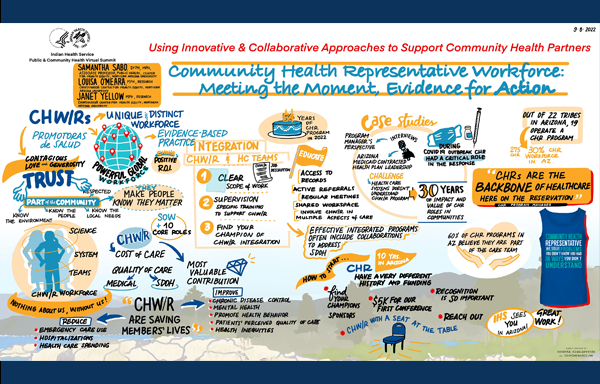Arizona moves toward reimbursing community health workers through Medicaid

Community health workers (CHWs), community health representatives (CHR) and promotores de salud are the pulse of the people—they are the trusted link between community members and health and social systems.
This workforce—estimated at more than 2,000 workers—operates across Arizona, in health and social services, housing, education and justice among many other sectors, accompanying Arizonans on their journey to optimal health and wellbeing.
November 8, 2022, marked a monumental moment in the history of this important workforce with the opening of voluntary CHW certification.
The application portal for voluntary CHW certification features a variety of resources, including a checklist, to help CHWs and CHW employers gather the required documentation to complete the application on the Individual Licensing Portal.
“Voluntary CHW certification is critical to the sustainability of the CHW workforce, which for more than 50 years has relied on a patchwork of funding making it harder for CHWs and CHRs to operate at the top of their scope of practice,” said Louisa O’Meara, Center for Community Health and Engaged Research (CHER) senior research coordinator. “We also know that voluntary certification of the CHW workforce is associated with better wages, which helps recruit and retain CHWs, lifting the whole workforce up.”
Arizona Health Care Cost Containment System (AHCCCS) plans to submit a State Plan Amendment (SPA) to make reimbursement for CHW services possible. According to the AHCCCS SPA, “certified community health workers acting within their scope of practice as defined in state law may provide AHCCCS-covered patient education and preventive services.”
AHCCCS plans to reimburse CHW services. The proposed reimbursable service codes include CHW education and training for patient self-management by a qualified, non-physician health care professional using a standardized curriculum, face-to-face with the individual patient (code 98960) a group of two to four patients (code 98961) or five to eight patients (code 98962)—all could include caregiver or family and are billed in 30-minute increments.
According to a recent paper, “Organizational Readiness for Community Health Worker Workforce Integration Among Medicaid Contracted Health Plans and Provider Networks: An Arizona Case Study,” authored by Samantha Sabo, associate professor, NAU Department of Health Sciences and CHER, and O’Meara, the CHW workforce, including tribally employed CHRs, has emerged as a healthcare workforce able to enhance the patient experience of care, improve population health, reduce cost of care, and improve the experience of providing care among clinicians and staff.
In another publication by a collaborative team about the CHR workforce employed in tribal communities throughout Arizona and 30% of the total CHW workforce in the state, CHRs are a highly trained, standardized workforce with tremendous potential to be better integrated into health systems and care teams.
“Through our work, we have learned how Arizona licensed providers operating in federally qualified health centers, Indian Health Service and 638 health centers and in behavioral health setting and leaders of Arizona’s Medicaid contracted health plans understand the value of this workforce and the potential for CHWs and CHRs to continue to save lives by forming trusted relationship to address the root causes of health and wellbeing among Medicaid members.”
Sabo has dedicated 20 years to CHW, CHR and promotora workforce research and policy. She is a founding member of the Community Health Representative Movement Coalition, a broad-based partnership of 19 CHR programs, tribal and state health departments, and American Indian health policy organizations and is the president of the board of the Arizona Community Health Worker Association (AzCHOW).
“Arizona is a leader in CHW workforce policy and AHCCCS is a true collaborative partner engaging CHW, CHR and promotora workforce members and employers to ensure CHW reimbursement works for all agency types,” Sabo said. “We are so grateful for their dedication and expertise in this exciting phase of workforce sustainability!”
CHER’s contribution to developing CHW workforce policy
On May 16, CHER convened the AHCCCS CHW Workgroup along with several CHWs and CHW employers to discuss CHW reimbursement through an Arizona Biomedical Research Centre workshop, The Power and Promise of Community Health Worker Voluntary Certification.
Visit the CHER’s community health worker initiative to learn more about this workforce, to find out ways to get involved and to download policy briefs to support CHWs, CHRs and promotores today.
